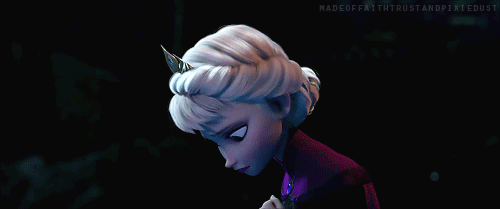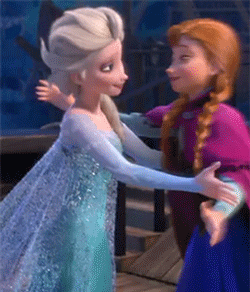It’s been almost a year since Frozen blew into
theaters, smacking the world full in the face with catchy songs that wouldn’t
die for months to come. It was a force of nature, becoming the second highest
grossing movie that year, second only to Hunger Games. It broke the record for
the highest grossing animated film of all time. And, according to some, caused
the polar vortex with the sheer force of its popularity.
Or maybe that was climate change. In any case, it
was one mega hit. At this point, everyone has talked about it. It seems kind of
redundant to discuss at this point. But with Frozen now crossing over with Once
Upon a Time on ABC, and a million little girls buying Elsa costumes for
Halloween, it’s clear that the Frozen craze hasn’t died out. It has persisted
on. And that’s great, because I love Frozen. But I think sometimes people focus
on the wrong elements. Namely Elsa.
So today, I want to talk about something a bit
controversial: Why you shouldn’t want
to be Elsa.
Now I should mention, I don’t hate Elsa. Elsa is an excellent character. She’s well written
and complex. Beneath her beautiful voice, she has layers. She is also a
relatable character. The struggles she goes through can be representative of a
lot of real life struggles.
What she is not
is a perfect role model. She is not a pillar of independence either. And
she is not supposed to be, but I feel
a lot of people look up to Elsa in a way that they… shouldn’t. What do I mean
by that? Well, let’s look at Elsa’s arc throughout the movie.
Elsa’s
Journey
Elsa starts out as a girl enthused with her powers
over ice and snow. The abilities she sees as normal are called into question
when she hurts her sister, Anna, by accident. Elsa is then locked away from the
world by her parents in order to protect her but this only compounds her
anxiety and fear of herself. As a result she grows up into an unstable,
emotional wreck of a person hidden under a thin veil of control.

The control snaps and Elsa runs. It is in isolation
that she finds she can use her powers without fear and she ‘lets it go’ in the
most remembered moment of the movie.

And here’s where
we spy the problem. Most people get stuck at this part of the movie. The ‘Let
it Go’ part. A lot of people see this as an anthem of independence, especially
for girls. A statement that Elsa is strong and can stand on her own and
shouldn’t be forced to suppress who she is. This is the song everyone belts
with glee.
But here’s the funny thing about ‘Let it Go’. Given
its placement in the movie… it isn’t a happy song. Elsa thinks isolation away
from everyone is the solution to her problem and she is wrong. If this song was
at the end, it would have had different meaning. But here, after Elsa has fled
her home in favor of a life apart from everything she has ever known, it’s kind
of sad.
“But how can it be sad,” you ask. “Elsa seems so
free while she sings it. She’s smiling and relieved.”
That’s just what makes ‘Let it Go’ so complex. Elsa
thinks she has found the solution to her problems and she is relieved. But it’s
only a temporary solution. The fact that she would consider isolation as a step
up from what she had is incredibly sad. She’s just avoiding the problem further
like her parents did. Her parents locked her up. Elsa does the same thing on
her own terms. And neither of these things was the right thing to do.
Let’s continue to follow Elsa’s journey. After she
sings this rousing anthem that everyone focuses on, Anna finds her. And it
turns out Elsa is still consumed by fear. She’s afraid to be with her sister.
And after finding out the consequences of running away, she has a break down
and hurts her sister again. Only this time, the damage is worse.
Later, Elsa is captured after almost being crushed
by the chandelier of her ice palace. She breaks out and once again tries to
run, not believing that she can take care of her sister. After being told that
her sister is dead, she gives up and is ready to die. It is only Anna’s act of
true love that saves Elsa and Anna herself. And then Elsa discovers the true
answer to her problem. Not avoiding it. Not using fear to try to control it.
But love.

That is the answer to this movie in the end. Not
independence but love and community. This is not a movie about independence. It’s about going the distance for
the ones you care about most. It’s about sacrifice. And it’s about the power of
love. That is what allows Elsa to be who she truly is.
You see, we shouldn’t want to be Elsa. We should want
to learn from her.
Elsa is relatable. A lot of us have been in a place
where we feel alone. And we think the easiest solution is to stay that way. I
think a lot of people latch onto ‘Let it Go’ as a confirmation of what they
already believe. ‘I should just be independent and stand on my own and that’s
the solution’. But that’s not the true meaning of Frozen. Like so many Disney
movies, it’s about the redemptive power of love.
Now, Anna isn’t a role model either. Like Elsa, she
has her flaws and her problems. That’s what makes Frozen so great. The
characters are so very human. Relatable rather than examples to be followed.
Characters that go on a journey that we should learn from.
The thing is, I am
like Elsa a lot of times. I’m like Elsa during ‘Let it Go’. But I don’t
want to be. In the end, what I want and need is my family and friends. I need a
community. I need to acknowledge that I can’t do it on my own. And that’s what
Elsa needs.
That’s what all of us need.

This is my first time visit here. From the tons of comments on your articles,I guess I am not only one having all the enjoyment right here!
ReplyDeleteWatch Frozen 2 (2019) Free Streaming